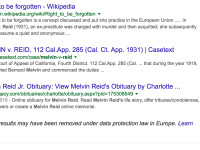The free and open access to law movement is devoted to providing free and open online access to legal information. This includes case law, legislation, treaties, law reform proposals and legal scholarship. This week’s Lawbytes podcast highlights perspectives on free and open access to law from Australia and Canada. During a recent trip to Australia, I spoke with Professor Graham Greenleaf, one of the pioneers of the movement, who co-founded AustLII, the Australasian Legal Information Institute. Following in the footsteps of the Legal Information Institute at Cornell University, AustLII helped reshape legal publishing in Australia and played a pivotal role in bringing other countries’ legal materials online. The episode continues with a conversation with Xavier Beauchamp-Tremblay, the current CEO of CanLII, the Canadian Legal Information Institute, about the Canadian past, present and future of free and open access to law.
Post Tagged with: "canlii"
Did a Canadian Court Just Establish a New Right to be Forgotten?
The European Union shook up the privacy world in 2014 with the creation of “the right to be forgotten“, creating a system that allows people to seek the removal of search results from Google that are “inadequate, irrelevant or no longer relevant.” The system does not result in the removal of the actual content, but rather makes it more difficult to find in light of the near-universal reliance on search engines to locate information online.
Since the European decision, Google has received nearly 700,000 requests for the removal of links from its search database resulting in the evaluation of 1.8 million URLs. Moreover, privacy authorities in Europe – led by France’s national regulator – have adopted an aggressive approach on the right to be forgotten, ruling that the link removal should be applied on a global basis.
My Globe and Mail op-ed notes that while the Canadian courts have grappled with the question of removing links from the Google search database (a key case on the issue is awaiting a decision from the Supreme Court of Canada), there has been little sense that Canada would establish its own right to be forgotten. That may have changed last week as the Federal Court of Canada issued a landmark ruling that paves the way for a Canadian version of the right to be forgotten that would allow courts to issue orders with the removal of Google search results on a global basis very much in mind.
Swartz’s Death Places Spotlight on More Open Access To Information
The Internet community has been reeling for the past week as it grapples with the suicide of Aaron Swartz, a prominent digital rights activist who left a remarkable legacy for a 26-year old. Swartz’s contributions are used by millions of people every day as he played a key role in developing the specifications for RSS (which makes it easy to syndicate online content), Creative Commons licences (which makes is easy to make creative works freely available), and the popular website Reddit.
My weekly technology law column (Toronto Star version, homepage version) notes that while much of the immediate focus has centered on mental health issues, draconian computer crime laws, and the bewildering prosecution of Swartz for downloading millions of academic articles – a U.S. prosecutor was seeking as much as 35 years in jail despite the fact that Swartz did not benefit from the downloads and the source of the articles did not want to pursue legal action – the more notable legacy was his effort to make information more openly and freely available.
Swartz’s Death Places Spotlight on More Open Access To Information
Appeared in the Toronto Star on January 20, 2013 as Internet Activist Death Places Spotlight on More Open Access to Information The Internet community has been reeling for the past week as it grapples with the suicide of Aaron Swartz, a prominent digital rights activist who left a remarkable legacy […]
CanLII and Lancaster House Launch Free E-Text on Wrongful Dismissal and Employment Law
CanLII and Lancaster House have launched a free e-text on Wrongful Dismissal and Employment Law. The text is the first openly available text on CanLII with all 23 chapters posted online.








